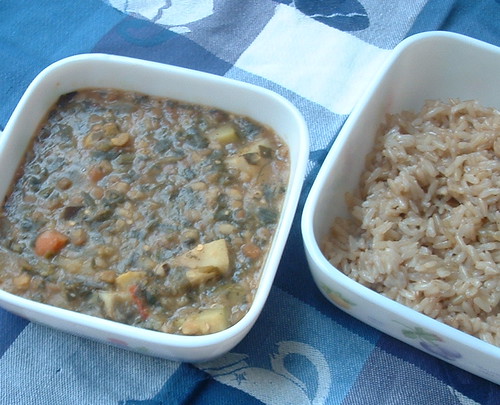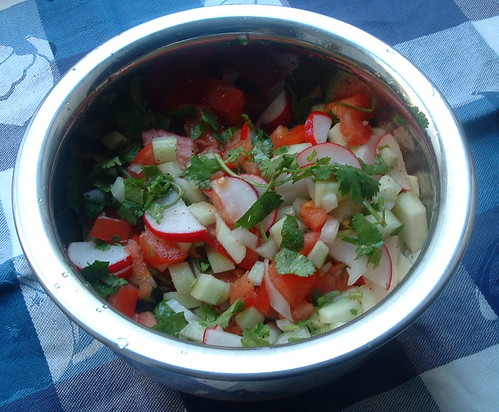Today's book: Family Matters by Rohinton Mistry
The food: A Parsee meal of Vegetable Dhansak, Brown Rice and Kachumbar
English language books by authors of South Asian descent is one of my particular obsessions, so the first book I have chosen is from this genre. Family Matters by Rohinton Mistry is a story of a middle-class Parsee family in Bombay. The Parsees are a small minority community in India; they practice the Zoroasterian faith, the worship of fire. This small but vibrant community has produced several talented authors, and Rohinton Mistry is my favorite. Mistry has an incredible gift: he has the ability to take the ordinary and make it lyrical. He speaks of the everday business of life and in doing so, paints a vivid picture of life in middle-class Bombay, especially that in a Parsee household.
In the following scene, Roxana, who lives in a tiny apartment with her husband and two boys, has her elderly injured father come to live with her. One of her boys offers to help feed him.
"Jehangir filled the spoon again and raised it to his grandfather's lips. A grain of rice strayed, lingering at the corner of his mouth. Jehangir took the napkin to gently retrieve it before it fell.
And for a brief instant, Roxana felt she understood the meaning of it all, of birth and life and death. My son, she thought, my father, and the food I cooked…A lump came to her throat; she swallowed."
Food and its trappings are often found in this story. One paragraph that really made me laugh (because I identified with it so closely) was when Roxana's boys read story books by the English author End Blyton and dream of the food oft-mentioned in Blyton's books: "Muffins, porridge, kippers, scones, steak and kidney pie, potted meat, dumplings. Their father said if they ever tasted this insipid foreign stuff instead of merely reading about it in those blighted Blyton books, they would realize how amazing was their mother's curry-rice and khichri-saas and pumpkin buryani and dhansak. What they needed was an Indian Blyton, to fascinate them with their own reality"
The Parsee-inspired meal that I served included brown rice pilaf, a vegetable-dal stew called dhansak and a simple salad called kachumbar. The "brown rice" traditionally served in the Parsee meal is white rice which is browned by the addition of caramelized sugar, but I made "real" brown rice, because it is so much healthier, and because it goes perfect with the dhansak. Speaking of which, I tried looking for an authentic dhansak recipe on the internet. A google search yielded this recipe for a pretty non-authentic dhansak. But this webpage has a true treasure: scroll down to the last two lines of this page, and someone has provided a recipe (there is a link to a word document) for vegetarian dhansak. I have simplified and modified the recipe somewhat. The meal was delicious enough to be a special treat, and yet bursting with health, with all those wonderful lentils, whole grains and vegetables, both raw and cooked. The recipe for dhansak sounds tedious, but it is a snap to put together once you have the ingredients at hand.
Dhansak

Ingredients:
(1) 1 + 1/2 cups mixed dals (I used toor, masoor, moong, chana and urad; use your favorites in any proportion)
(Soak the dals for a few hours, then cook and set aside; you could use a pressure cooker or the stove-top method)
(2) Vegetables:
Eggplant
Zucchini
Potato
Yellow Squash
Carrot
Tomato (Dice all the veggies for a total of 5-6 cups of mixed veggies)
(3) Tempering:
1 tbsp oil
1 onion, diced
1 tsp ginger-garlic paste
(4) Dhansak Masala: Toast the following together (I throw it in the microwave for 1-2 minutes on low power...it works!)
2 red chillies
1 inch cinnamon
8 black peppercorns
2 dried bay leaves
8 cloves
1 tsp fenugreek (methi) seeds
1 tbsp sesame seeds
1 tbsp cumin seeds
1 tbsp coriander seeds
Grind roasted spices together. Add 1/2 tsp turmeric powder and 1/2 tsp nutmeg powder. Set masala powder aside.
(5) Herbs/greens:
1 cup packed spinach (fresh or frozen)
1 tbsp dried fenugreek leaves (or 3-4 tbsp fresh, minced)
1 tbsp dried mint leaves (or 2 tbsp fresh, minced)
Method:
1. Heat oil, then saute the onion till transluscent. Add the ginger-garlic and fry for a minute.
2. Add the diced veggies and 1/2 cup water, cover and cook till the vegetables are tender.
3. Now add the masala, salt to taste, the herbs and the dals. Cover and simmer for 10-15 minutes.
Brown Rice Pilaf
Ingredients:
2 cups brown basmati rice
4 and 1/4 cup water
dash of salt
1 tsp ghee
1 bayleaf
2 tsp whole spices (cloves, cinnamon, cardamom, peppercorns)
Method:
1. Heat the ghee and gently saute the bayleaf and whole spices for a few seconds.
2. Add the rice and saute for a few seconds.
3. Add water and salt, cover the pot and cook for 30-40 minutes till the rice is tender and the water is all absorbed.
Kachumbar

Mix together diced tomatoes, onions, cucumber and radishes. Season with salt, pepper, a dash of sugar and a dash of vinegar. Sprinkle with some minced cilantro.
Here are links to two other Parsee recipes:
Patrani Macchi: Deccanheffalump gives a wonderful introduction to Parsee cuisine, with a bit of history thrown in, and this fish recipe.
Pateta par Eeda This is a tasty eggs-and-potatoes brunch dish that is a favorite with V and me.
Please let me know how you like this series. Ideas for books that you would like to see featured are welcome too!

I highly recommend 'The Turmeric trail'by Raghavan Iyer. It is actually a cookbook but it almost sounds like reading a family journal(it is about a tamil iyer family living in Mumbai).
ReplyDeleteI read 'Family matters' sometime back and it was very moving account of how badly old parents are treated. 'Namesake' and 'God of small things' had a lot of food references but you must have already read them...
hi nupur, what a wonderful idea. v v innovative. satiates two appetites at one go.. 1 for good food and the other for good books.keep it up!
ReplyDeletetarla dalals dhansak comes out v well. do you have the recipe? if not i,ll send it to you.luv, yoma.
Thanks for posting the recipe for dhansak masala. All the recipes that I have simply mention that I need to add 1 tsp or 2 tsp etc without mentioning how to make it.
ReplyDeleteI enjoyed your post and am interested in reading Mistry's novel. I loved the first quote especially. It's funny because I just put up a post celebrating Father's Day wherin I reminisce about my own father and the foods he loved. Food is such a wonderful thing that links our past to our present. Thanks for your post.
ReplyDeleteNupur, what a brilliant idea! Esp as Rohinton Mistry is one of my favourite authors too - and I fell for that exact same para you've mentioned... Enid Blyton's food! :) (Mind you, I've been tempted by burgers as well (before I knew what they were) thanks to Jughead & Archie comics!)
ReplyDeleteI think I'm very likely to come up with books/recipes as contribution towards this series of yours. Good luck!
Hi Nupur - I really do love this idea! Of course, now I'll be busy not only trying to keep up with all your recipes that I want to try, but all the books I must read!
ReplyDeleteI have a question about cooking the dals for the Dhansak - do you have to cook each one separately because the timing is different, or can you get by cooking them all in one pot?
Mika, Turmeric trail sounds interesting...I am going to get it from the library. Yes, I love both "namesake" and "god of small things" but many feature them at some future point. Thanks for your suggestions!!
ReplyDeleteYoma, thanks...no, I don't have Tarla's recipe for this.
Krithika, yes, I was very pleased to find this recipe :)
Lisa, thanks! I'm so glad you liked it!
Shammi, I'm so glad you like the idea...and I would LOVE to hear your suggestions...or if you want to post with me.
Cathy, thanks for stopping by! You can cook all the dals together...they are cooked into a mush, really, so the different times do not matter.
Here's an authentic recipe for brown rice - parsee style. Try it. :)
ReplyDeleteIn a little oil saute some (per taste) whole cardamoms, cloves, bay leaf and 1 small piece of cinnamon bark till fragrant. Then add 1 tablespoon of sugar (regular white) and let it caramelize. It should turn really dark brown. Add pre-washed white basmati rice and stir it till it is completely coated with the browned sugar mixture. Add the water, cover and let cook till rice is done. This will make your kitchen smell heavenly - I promise.
Thanks Nupur - I was hoping that was the case (all the dals being mush and timing not being critical)! This does sound so good - hope to try it this coming weekend. Best wishes for your conference!
ReplyDeleteDilnaz, thank you sooo much! how generous of you to share an authentic recipe :) I'm going to try this soon!
ReplyDeleteNeelu, I would suggest buying a "coffee grinder" costs about 15$ and using it exclusively to grind dry spice powders. it is worth every penny. It grinds them to a really fine powder. mind you, you cannot use it for wet masala pastes, only dry ones.
Cathy, let me know if it works :)
Dear Nupur,
ReplyDeleteI discovered your blog recently and loved it. I just wanted to let you know that I made vegetable dhansak today according to your recipe and it turned out to be very tasty (if I might say so myself :-)). Thank you.
-Debjani